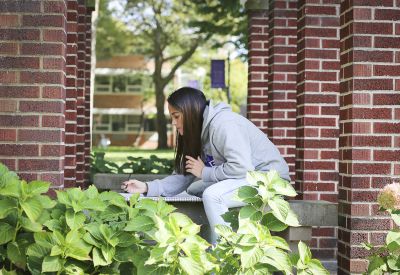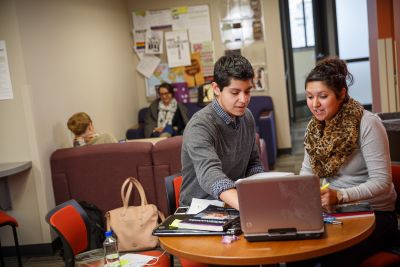College Study Tips
As you head into college, whether for the first time or as a returning student, make sure that you’re ready to take on a semester of papers, quizzes and exams by brushing up on your study skills.
Everyone functions and learns a little differently — what works for that girl in your chemistry class may not work so well for you. But don’t worry! Answering a few questions can show you the best study environment for your body and brain so that you’ll have all the tools you need to succeed.
-
What’s my best type of organizational tool?

Find something that you can use to keep track of your busy schedule and to-do lists. Knowing what all of your assignments and appointments are is the first step to being prepared for them. Some ideas:
- Planner: Keep all of your assignments and important dates in a book that you can carry in your backpack wherever you go. Bonus: You can get one that matches your style!
- Desk calendar: If you have a lot of meetings, a work schedule that’s hard to keep track of or a lot of deadlines to meet, a desk calendar will keep them all organized — and right under your nose.
- Digital calendar: A digital calendar has the same function as a desk calendar, but you can access it anytime from your computer, smartphone or tablet. You can also set reminders for events so that you never miss an appointment.
- Use a digital reminders/list app: Make checklists and have your computer, tablet or phone remind you to do them. Examples: Google Keep or Reminders (Mac).
-
What time of day am I most alert?

Your body’s natural rhythms might be telling you not to study too late at night or too early in the morning. If you can, plan to study at the time that your brain is the most awake. This may take some experimenting, but you’ll be much more efficient (and happy) if you find out when that is. Tip: If you knew the information earlier in the day but now everything feels like it got sucked out of your head, your brain might be overtired. Go to sleep and then try again in the morning —you might be surprised how much you remember!
-
In what environment do I feel most comfortable and productive?

Find a place to study where you feel relaxed but not too distracted. This might be at the desk in your room, in the library, outside under a tree or at a favorite spot on campus. Where it is doesn’t matter as much as if it works for you.
-
How many people can be around when I study?

Some people work best when they have a study buddy to bounce ideas around with, some people like to be surrounded by people in a restaurant or coffee shop and some people work best alone. Or maybe it’s a combination. If none of these ideas seem to work for you, try studying by yourself first and then meeting up with a friend or two. You might be able to help each other through the tricky spots.
-
In what level of noise can I best concentrate?

Again, this is all up to you. Some people have to study in complete silence, some put on their favorite music to have something familiar and some like ambient background noise like people talking in a public space. Try studying with a few different levels of noise and see what works the best for you.
-
In what medium do I best process information?

Some people love using computers or tablets to read or take notes, but some people need the actual paper or book in their hands. If you work better on a computer, make sure your files are organized and have backups so that you can always find the information you need. If you work better with the physical copy, print out articles that you need to read and make sure you have a sturdy notebook.
-
How can I best commit information to memory?

Learning how your memory works is one of the most important things you can do before you study. Some people can look at something once and remember it, but some people have to spend a little more time on it. Here are some strategies you can try:
- Use Quizlet: Make all of your data into a set of flashcards, then try out the different games and quizzes. Reviewing the information multiple ways will help cement it in your memory, so make sure you switch it up.
- Write everything down: Some people have an easier time remembering things if they handwrite it.
- Make associations: Connect the information you’re trying to remember with something silly, a place or object in the room, or a mnemonic device so that it triggers your memory when you’re trying to recall the information.
-
How am I the most comfortable in a testing environment?

Make sure that you go into a test as ready to go as you can be. For some people, this means dressing up so that they feel professional; for others, this means wearing comfortable clothes so they feel relaxed.
What other tips or tricks help you be a better student?




